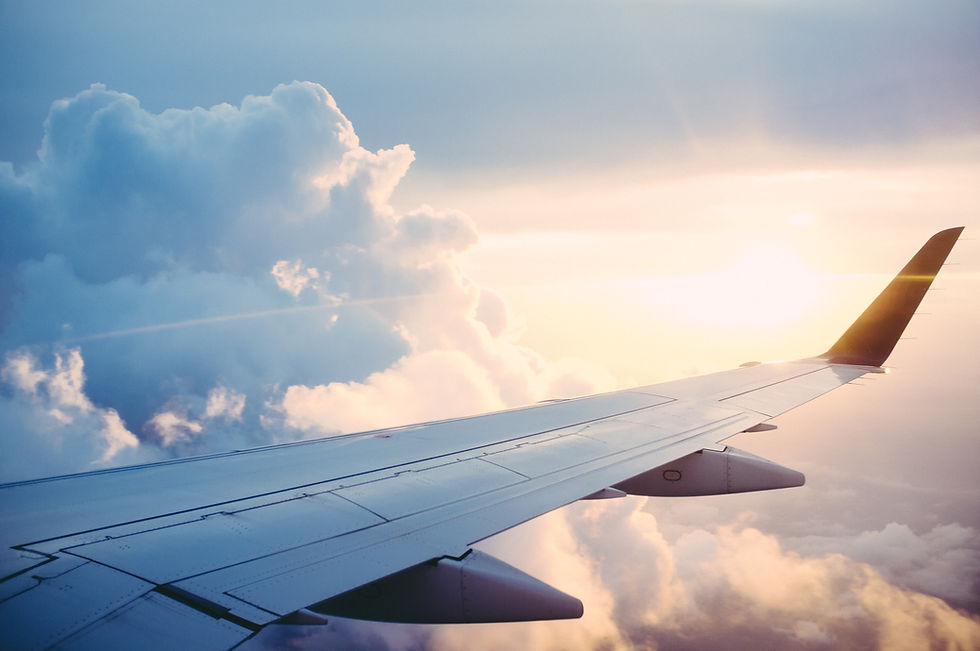Jet Lag Journeys: Tips for managing time zone changes with children
- Mary Alex Daniels

- Dec 10, 2023
- 3 min read

Jet Lag can turn a long anticipated family vacation into a trip to the land of frustration , especially when children are involved. Growing bodies and sensitive routines mean children often feel the effects of time zone changes even more than adults. With a bit of advance planning you can help your family adapt to a new time zone like a seasoned globetrotter.

Understanding Time Travel
Jet lag occurs when the circadian rhythms our body operates on tell us when we should be awake and when we should be asleep. These rhythms don’t adjust instantly to a new time zone, which is why we feel out of sorts after a long flight.
For children, who thrive on routine and predictability this sudden change can be especially impactful, and the younger your children are the harder this is for them to understand.
Set yourself up for success
Pre flight...
When booking your accommodations consider sleeping arrangements. Is everyone in the same room? Will children have to share a bed? Are roll away extra beds permitted in your space or a blow up mattress? If possible, giving everyone their own sleeping space will lead to better sleep.
Adjust schedules before you even leave. A few days before departure start nudging nap time and bedtime closer to the schedule of your destination. Even a small shift can make a difference in how children adapt.
For older kids, discuss what jet lag is. Help them understand what is happening and give them tips on how to minimize its effects.
Soaring with serenity
In flight strategy...
This is where you will benefit from that advance planning, based on what will work best for your family. Choose your flights wisely. Would you rather leave early and arrive early or land later in the day?
Create a cozy environment. If you have a red eye flight or want your children to nap, pack familiar items like a blanket or pajamas to make them comfortable enough to relax and sleep on the plane, pack a sleep mask.
Hydration also goes a long way in alleviating jet lag. Be sure to be consistent with your sips of water (still not sparkling for hydration). Often children will like to bring along a special travel water bottle. Skip sugar filled juices, caffeine, and (for those of age) alcohol- these all can further disrupt your sleep cycles.
When awake, take walks up and down the aisle and have your children do the same. Movement will help to regulate your body’s natural rhythms.

On Arrival: Synching with local time
Embrace the daylight.
If you land when the sun is up, resist the urge to nap. Get outside for fresh air. Daylight is a powerful signal to your body that you should be awake.
Eat on local time.
From the start begin to have your meals at the local time. This will re set your internal clock. For children, bring along some favorite snacks to ensure they eat if you think they will be unsure about a new cuisine.
Don’t overplan activities
For the first few days plan light activities. No one wants the added stress or pressure of having to do a pre booked or expensive activity when they are still adjusting to a new schedule.
Bedtime
Stick to your routine.
Maintain a schedule similar to that of home. For example, if your child always reads or sings before bed make sure that happens on vacation too.
Control the light, as much as possible. Make use of hotels blackout curtains by making sure they are drawn at bedtime and opened in the morning light. A sleep mask can be valuable again if you do not have blackout curtains.
Quiet the mind
Children, like adults, can have trouble settling down and falling asleep. Consider a guided meditation for children or use music to soothe their way to slumber.
To remember
A comfort item aids familiarity and can be a game changer in helping children adapt.
Patience and understanding go a long way in helping soothe irritable and emotional tired children.Every family member will adjust differently and have different coping needs.
Jet lag doesn’t last forever. By preparing yourself in advance you can help your entire jet setting family adjust in the best way possible; insuring your vacation memories are about the experiences you have had and not just the sleep you have missed.


Comments